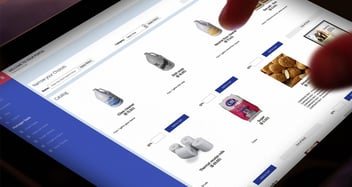1. Identifying mobile apps’ business potential
A great place to start when assessing the business potential of mobile apps is to ask yourself these three questions. These questions are widely used in service design, and they help you exemplify use case scenarios and estimate whether the application is going to create added value for the user.
- How and in which situations is the service going to be used?
- Who is the user going to be, how broad is your service’s potential target audience?
- What is your service’s usage frequency, how often is it going to be used?
To give an example from our past projects, we used these same questions while developing the mobile application for the car wash service Juhlapesu.
How and in which situations is the service going to be used? You rarely decide to get your car washed while lying on your couch. The thought often pops into your head while you’re already on the road: on your way to the store or home from work. A mobile app streamlines the whole car wash process from keeping your car clean to checking how long the queue at the car wash is before heading there. When you are on the move, mobile apps are also significantly more user-friendly than, e.g., websites.
How broad is your service’s potential target audience? In our example, the target audience comprises of every Finnish car and smartphone owner – so the user potential is huge. And what is your service’s usage frequency? Car wash frequency varies between users. Some have a regular weekly wash schedule, while others realize that their ride might need cleaning when they can no longer tell what color it is. By improving the user experience and reminding the user of the service, the application helps increase usage volumes.
2. How can I know if my mobile app is going to generate ROI?
When defining the business potential of a mobile app, you should also estimate the scale of your investment in relation to the value it generates. In other words, make an assessment of the return on investment of your app. Is it going to create business value for your company? Sometimes this assessment is easy to make. For example, Wolt food delivery service and Über taxi service have based their whole business on a mobile app. Similarly, the value of streaming services for both users and business is evident. Mobile streaming services, such as Netflix, are used by a wide audience on a daily basis, even when commuting.
But when the investment is harder to validate, you can ask yourself the following questions to assess its ability to pay for itself:
- What are we striving to achieve?
- How can its value be measured?
If your goal is to increase the usage frequency of your service by improving its availability and memorability, a mobile app can potentially do the trick. For example, fast-food chain Hesburger increased its sales by 25% by digitalizing its loyalty club. One of the benefits of the mobile app was increased availability as users now have the popular Hesburger discount coupons at hand at all times. Similarly, by streamlining the service experience and bringing the service to the users’ home screens, the Juhlapesu mobile app enhanced the availability and memorability of the car wash service.
3. Compare different development options
Finally: learn about different development options and compare them before you get started with the actual software development. Applications can be built in several ways, e.g., as native apps or PWA apps (Progressive Web App). Read more about the different options available to you in Juha’s earlier blog post Overview of Mobile Development Frameworks in 2019.
People typically prefer mobile apps, but in some cases, a mobile-friendly website might be just as useful for your users. Mobile-optimized websites load quickly, require no installations, and can use the technical features provided in different devices, like positioning. A mobile-optimized website may be a good alternative when, for example, your budget does not suffice for mobile app development.
You do not have to choose the development method alone. Discussing your options with the partner you have chosen for the application development project is always a good idea. However, acknowledging that there are different options available is important. And enough for now.
Get in touch, and we can create something great and mobile together!



